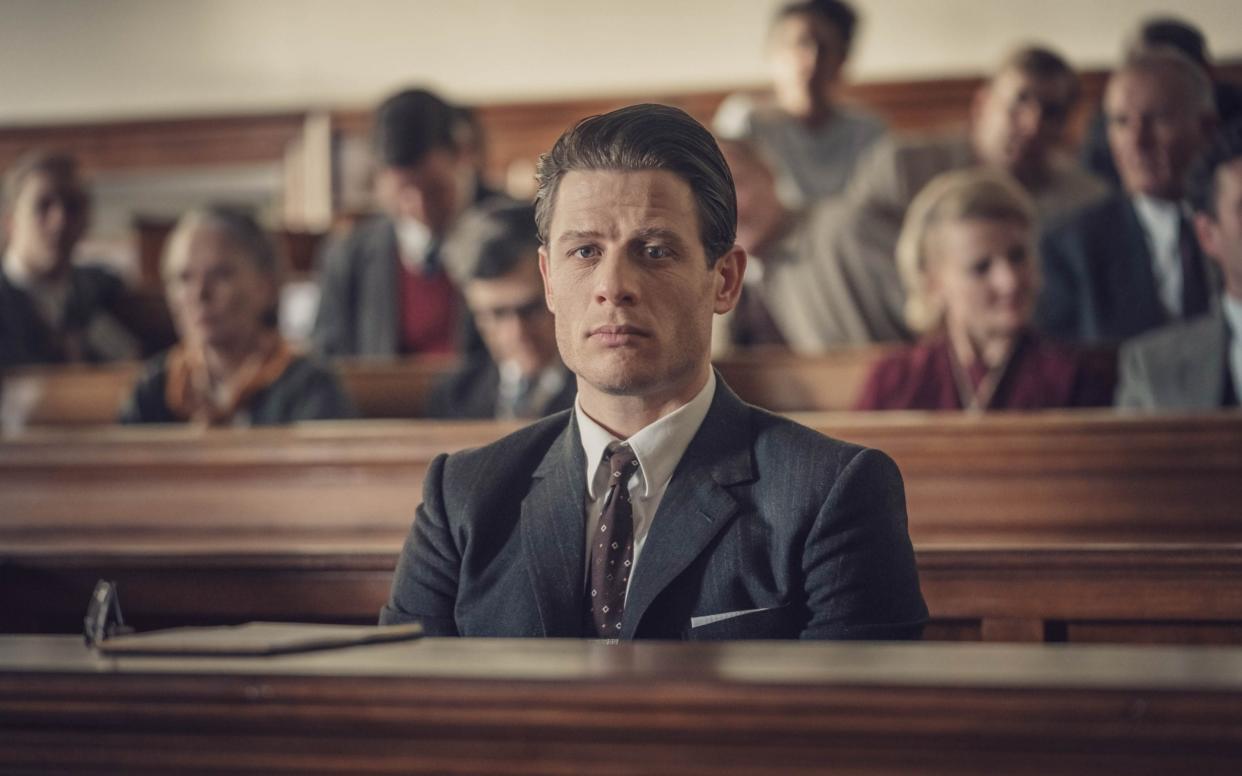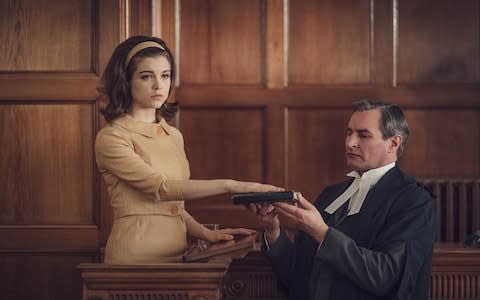The Trial of Christine Keeler, episode 5 review: a poignant performance from James Norton as Stephen Ward is thrown to the wolves

The fifth episode of The Trial of Christine Keeler (BBC One) was full of familiar images. Christine Keeler and Mandy Rice-Davies in the back of a car on their way to court. Rice-Davies (Ellie Bamber), in that flamingo pink hat, waving and blowing kisses to the public outside the Old Bailey. And here was Rice-Davies on the witness box uttering the words that have been (mis)quoted ever since: “Well, he would, wouldn’t he?” in response to the news that Lord Astor had denied ever meeting her.
The final scenes, though, were familiar in another way. Dr Stephen Ward, on the eve of his trial verdict for living off immoral earnings, took an overdose from which he would die several days later. He was played, and played well, by James Norton. But Ward’s death has been portrayed before, in the 1989 film Scandal, by the great John Hurt. Everything seemed the same: the rolled-up shirt sleeves, the cigarette hanging from the lips, the suicide note in voice-over. Of course, the facts of Ward’s death are immutable. But the treatment was almost note-for-note, and served as a reminder that this BBC series is not as fresh as it thinks it is.
Scandal put Ward, the society osteopath who was a pivotal figure in the Profumo Affair, at the heart of the story. The BBC series aims to make Keeler (Sophie Cookson) the focus. Yet throughout it has been Ward who has held the attention. Perhaps this is down to Norton’s performance (excluding the “little baby” mentions, which must set some sort of record for most-repeated dialogue), or perhaps to the fact that Ward is a far more interesting character than Keeler, his motivations much less clear. “All I ever wanted was fun. For other people to have fun. Where’s the harm in that?” he said at one point. But that was hardly an explanation.
It was easy to feel sympathy for him, but this was a man who introduced young women to his rich and powerful and considerably older friends as if he was lending a book from his library, and who had sex with Rice-Davies when she was 16.

To a man, those rich and powerful friends deserted Ward in his hour of need. There was a meeting in a gentleman’s club, where they discussed the fact that they had “been beneficiaries of his hospitality over the years”. They took their cue from Viscount Astor (Michael Maloney), who had just legged it out of the country to avoid being tainted by the scandal. Norton found the poignancy in Ward’s dawning realisation that he had been abandoned. At the beginning of the episode, he was telling his lawyer: “I have never been a rich man apart from in my friendships.” By the end, as the judge put it when summing up the case against Ward: “He has been left, quite tellingly, to face the music alone. Entirely alone.”
It was hard to escape the conclusion that Ward was the fall guy driven to his death. Profumo (Ben Miles) was forced to resign from his job and face the wrath of his wife (Emilia Fox, good at controlled fury) but he was not thrown to the wolves. Screenwriter Amanda Coe rammed home the hypocrisy of it all: the News of the World hounding Keeler and Ward while celebrating the addition of a half a million readers through coverage of the trial; the prurient public tutting about the sordid sexual disclosures while turning up to court every day to drink in more of the details. Ward’s lawyer (Peter Davison) told him: “You have had experiences these people can scarcely admit they envy.”

And then there was Keeler’s mother, happy to take handouts from her daughter without asking questions about where the money came from. The pair shared one of the strongest scenes, as the mother branded Keeler as “nothing but a common prostitute” and Keeler replied as she gestured toward her stepfather: “No more than you are. Staying with him. Letting him give you a good poke when he rolls in from the pub just because he gives you housekeeping. At least I only have it away with blokes I actually fancy.”
As has been the hallmark of this series, the episode flitted annoyingly through time. We started with Ward’s trial, went back to Keeler at Cliveden, then six weeks before the trial began, and back to the present. When Ward turned up at an exhibition of his art works, which still drew a respectable crowd including a smiling Rice-Davies, I was momentarily confused – was that really happening midway through the court case? But I look forward to next week’s final episode and to see how Coe chooses to wrap things up.


